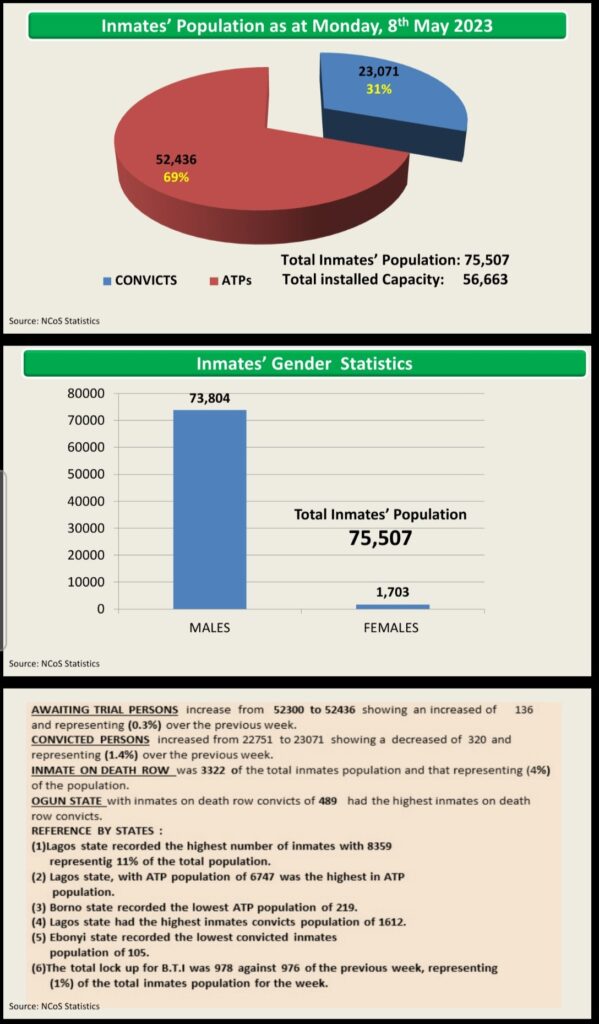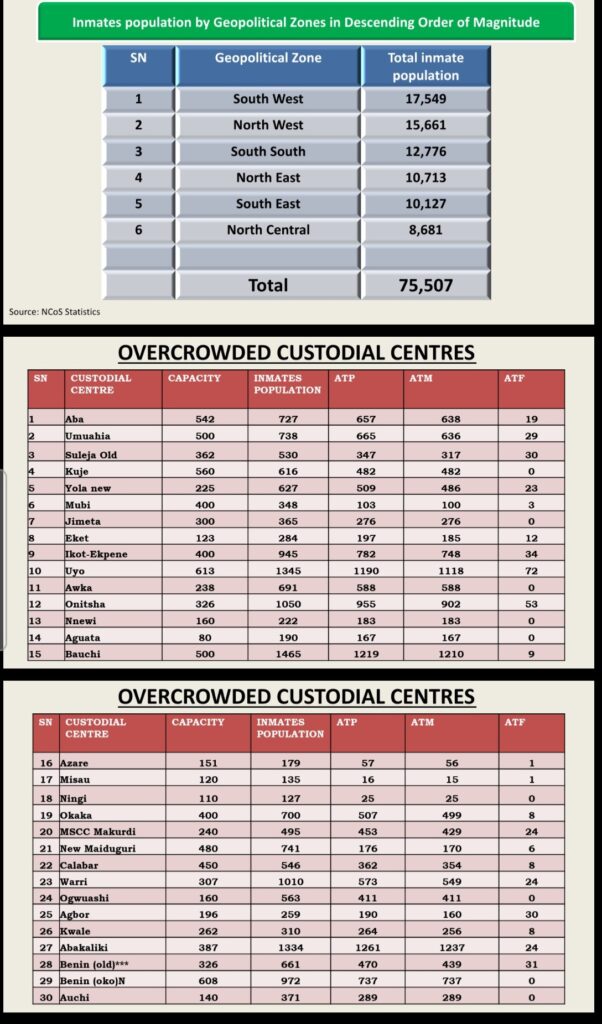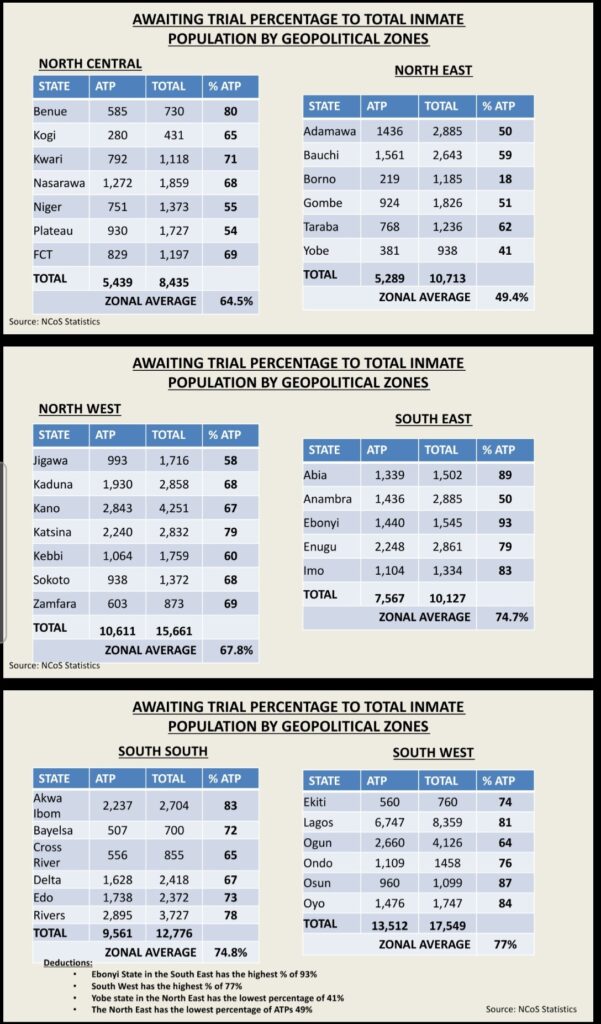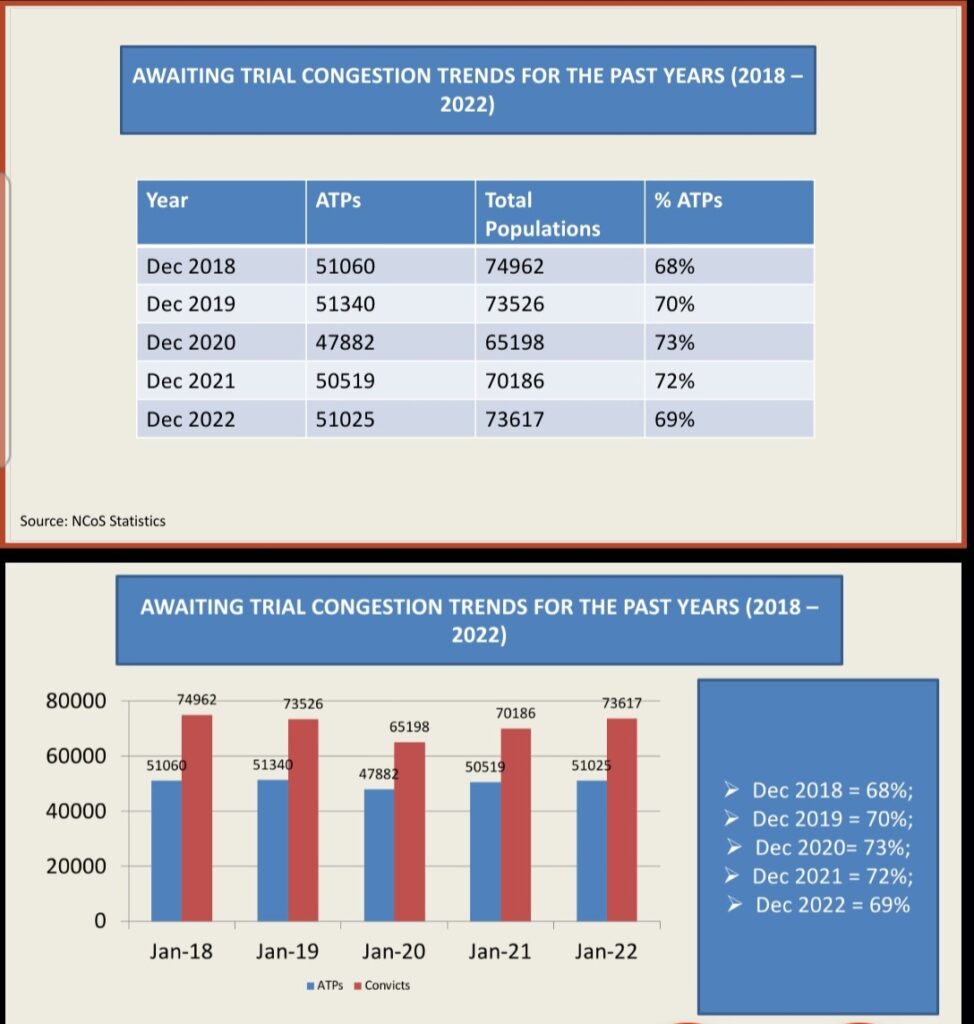*FG plans to cease inmate feeding to address overcrowding
Gift Wada
The Federal Ministry of Interior, in collaboration with the Non-Governmental Organization Prisoners’ Rehabilitation and Welfare Action (PRAWA), has highlighted the urgent need for reforms in pre-trial detention procedures in response to the issue of overcrowded prisons.
During the ‘High-Level Conference on Decongestion and Corrections Administration’ held in Abuja over the weekend, PRAWA revealed that the custodial centers in Nigeria currently accommodate a total of 75,507 inmates. Shockingly, out of this number, 52,436 individuals are classified as Awaiting Trial Persons (ATPs), while 23,071, representing 31%, have been convicted of various offenses and have been held for over 10 years. Additionally, more than 5,000 inmates have spent between 6 and 10 years in detention, and 3,322 inmates are on death row. The conference also brought to light the fact that 82 out of the 244 custodial centers are currently operating above their intended capacity, exacerbating the issue of overcrowding.
Uju Agomoh, the Executive Director of PRAWA, emphasized the necessity of developing clear guidelines for pre-trial detention to ensure that it is only used when absolutely necessary and that individuals are not unnecessarily held in custody for extended periods. She called for reforms in areas such as the duration of pre-trial detention, the utilization of bail, and the adoption of alternative sentencing options to reduce the number of individuals held in custody.
According to Agomoh, achieving pre-trial detention reforms necessitates broader criminal justice reforms to address systemic issues that contribute to prolonged detention. These issues include corruption, inadequate funding, and ineffective judicial systems. To implement these reforms effectively, she advocated for the training and capacity building of law enforcement officials, judges, and other relevant stakeholders.
Agomoh stressed the need for collaboration among the judiciary, law enforcement agencies, civil society organizations, international partners, and other stakeholders to address the challenges surrounding pre-trial detention. Such collaboration would ensure a comprehensive and sustainable approach to resolving the overcrowding crisis in Nigeria’s prisons.
At the conference, Haliru Nababa, the Controller General of the Nigeria Correctional Service (NCoS), reaffirmed the pressing nature of the issue and emphasized the need for efficient and sustainable strategies to decongest prisons across the country. The conference, organized by the Federal Ministry of Interior and supported by the NCoS, PRAWA, the Open Society Initiative for West Africa (OSIWA), and the United Nations Children’s Fund (UNICEF), provided a platform for stakeholders to discuss and formulate potential solutions to address the overcrowding crisis.
The overcrowding in Nigerian prisons is a critical issue that requires immediate attention. The joint efforts of the government, NGOs, and international partners, coupled with comprehensive reforms in pre-trial detention procedures and the criminal justice system as a whole, will be essential in addressing this pressing problem and ensuring a fair and efficient judicial process for all individuals involved.




May stop feeding of inmates
The Federal Government, led by Minister of Interior Rauf Aregbesola, has announced a significant decision to halt the feeding of over 75,507 inmates across the 244 federal correctional facilities nationwide. Starting from December 31, 2023, state governments will assume responsibility for providing meals to offenders within their respective states.
Aregbesola emphasized that more than 90 percent of the inmates within the correctional facilities are state offenders, making it essential for state governments to invest in their own corrections systems.
Previously, the federal government had allocated a budget of N22.4 billion for the feeding of inmates across the country, as outlined in the 2023 Appropriation Act. His new directive aims to reallocate the funds previously allocated for inmate feeding to other crucial areas.
Statistics provided by the Prisoners’ Rehabilitation and Welfare Action (PRAWA) shed light on the current state of overcrowding within the custodial centers. The total capacity of the centers stands at 75,507, with 52,436 classifieds as Awaiting Trial Persons (ATPs) and 23,071 representing 31 percent being individuals who have been convicted for over 10 years. Additionally, over 5,000 inmates have spent between 6 and 10 years in custody, while 3,322 inmates are on death row. Out of the 244 custodial centers, 82 are currently operating above capacity, exacerbating the issue of overcrowding.
Further analysis of the statistics reveals that Lagos State has the highest number of inmates, with 8,359 individuals, accounting for 11 percent of the total population. Lagos State also has the highest ATP population, with 6,747 awaiting trials. Conversely, Borno State records the lowest ATP population, with 219 individuals. In terms of convicted inmates, Lagos State tops the list with 1,612 individuals, while Ebonyi State has the lowest convicted inmate’s population of 105.
A closer look at the gender distribution of inmates shows that there are 73,841 male inmates and 1,703 female inmates across the country.
The decision to cease the feeding of inmates is a direct response to the pressing issue of overcrowding in Nigerian prisons. By shifting the responsibility to state governments, it is hoped that the saved funds can be redirected toward implementing measures to address the overcrowding crisis and improve overall conditions within correctional facilities. This decision highlights the need for comprehensive reforms in the criminal justice system and underscores the importance of collaboration between the federal government, state governments, and relevant stakeholders in finding long-term solutions to the challenges faced by the Nigerian prison system.

